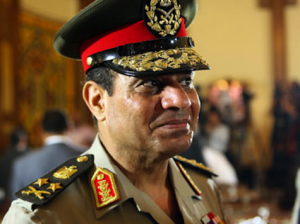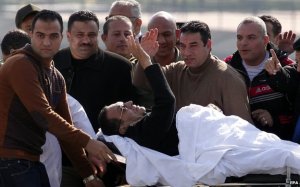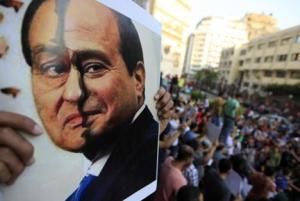With all due respect to the protesters, the issue is not whether Mubarak will go, for he will. (The man is 82 and already looks half dead for Christ’s sake!) Rather, the issue is who will replace him. And it appears they have not given any thought whatsoever to this very critical question…
The devil the Egyptians know might prove far preferable to the devil they don’t. Just ask the Iranians who got rid of the Mubarak-like Shah in 1979 only to end up with the Ayatollah Khomeini — whose Islamic revolution they’ve regretted (and have longed to overturn) ever since….
(“Army Pledges No Force Against Protesters,” The iPINIONS Journal, February 1, 2011)
This quote attests that I admonished, from the outset, that protesters were being hopelessly misguided and naïve. Sure enough, events that grew out of their protests duly vindicated my admonitions.
On Monday Egypt’s military chief Abdel Fattah al-Sisi gave the country’s democratically elected president, Mohamed Morsi, 48 hours to reconcile his irreconcilable differences with opposition forces. Never mind that Morsi had even less chance of doing this than Mubarak had of striking an eleventh-hour compromise with these same forces before the military deposed him.
This is why I find it so mind-boggling that, after reacting initially with justified defiance and righteous indignation, Morsi ended up looking just as feckless and fatally compromised as Mubarak did: offering a desperate plan at the eleventh hour for a government of national unity — with himself remaining as president.
Alas, just as it was with Mubarak, this was too little, too late. And, like Mubarak, it’s probably only a matter of time before Morsi ends up on trial for all kinds of alleged crimes against the state…
(“Egypt’s Democratic Military Coup?” The iPINIONS Journal, July 5, 2013)
 Unsurprisingly, as delineated in related commentaries, General al-Sisi punctuated this Sisyphean turn of events by instituting a new dictatorship, with himself as president, which is making Mubarak’s look benign by comparison….
Unsurprisingly, as delineated in related commentaries, General al-Sisi punctuated this Sisyphean turn of events by instituting a new dictatorship, with himself as president, which is making Mubarak’s look benign by comparison….
More to the point, though, here is the way I characterized an open conspiracy among al-Sisi and his military cohorts (i.e., even before they mounted their coup) to grant Mubarak reprieve from the life sentence the Morsi court handed down for his crimes:
I suspect that having him wheeled into court on his hospital bed every day during trial and this reported health crisis now are all part of a charade orchestrated by the Supreme Council of the Armed Forces – the military generals who still (and will continue to) rule Egypt – to exaggerate Mubarak’s downfall and suffering.
Furthermore, I suspect that he agreed to play along because he was assured not only that his sons would be acquitted, but that they would be able to keep millions in ill-gotten gains to live a very comfortable life in exile (no matter what additional show trials they must endure in the short term).
Not to mention that the ‘prison’ where Mubarak has been (and will continue) living out his last days would probably make the retirement home of any multimillionaire seem like a humble shack.
(“Protesters Return to Egypt’s Tahrir Square,” The iPINIONS Journal, June 6, 2012)
 This is why yesterday’s “shocking” decision by the al-Sisi court to formally dismiss all charges against Mubarak struck me as just pursuant to the open conspiracy I characterized two years ago:
This is why yesterday’s “shocking” decision by the al-Sisi court to formally dismiss all charges against Mubarak struck me as just pursuant to the open conspiracy I characterized two years ago:
The court dismissed murder charges against Mr. Mubarak in the killing of protesters demanding an end to his 30-year rule – charges that once inspired crowds to hand the president’s effigy from the lampposts of Tahrir Square…
The court also acquitted Mr. Mubarak, his two sons and a wealthy business associate of corruption charges; the three others had come to personify the rampant self-dealing of Mr. Mubarak’s era as much as the president himself…
(New York Times, November 29, 2014)
Mind you, to be fair, Mubarak is on record not only declaring his innocence, but also reminding Egyptians that he warned of the chaos and instability that have followed his unceremonious ouster. Here, in part, is the categorical statement he made before the court in August:
I, Mohammed Hosni Mubarak, who is standing before you today, never handed down orders for the killing of protesters… I would never hand down orders … to wreak chaos of which I had been warning…
I would never hand down orders to cause anarchy or a political vacuum.
(Al Jazeera, August 13, 2014)
 Frankly, all that’s left is for the dismissal of these charges to trigger another round of revolutionary protests:
Frankly, all that’s left is for the dismissal of these charges to trigger another round of revolutionary protests:
I hope I can be forgiven for taking a little credit for coining the phrase ‘never-ending revolution’ in “Egyptian Revolution Part II,” The iPINIONS Journal, July 14, 2011.
(“Egypt’s Democratic Military Coup?” The iPINIONS Journal, July 5, 2013)
Egyptian Revolution Part III…? In fact:
The dismissal of charges yesterday, after Mubarak’s initial conviction and life sentence were overturned in January 2013, sparked an anti-government rally of about 2,000 people [calling, yet again, for the ‘fall of the regime’] in Tahrir Square, the center of the revolt against Mubarak, now 86…
Critics contend the election of President Abdel-Fattah El-Sisi has allowed the reincarnation of Mubarak’s police state and crushed hopes of justice for the families of those killed in the uprising.
(Reuters, November 29, 2014)
Indeed, these are the same anti-government protesters who took to this same square last year to celebrate al-SiSi’s ouster of Morsi, and who did the same four years ago to call for the ouster of Mubarak.
Even so, the irony seems completely lost on them that, despite all of their revolutionary protests, the dismissal of all charges against Mubarak means that Egypt has ended up right where the Arab Spring was sprung.
But, if they think they can repeat against al-Sisi the miracle in Tahrir Square that led to the ouster of Mubarak, I have two words of admonition for these protesters: Tiananmen Square.
Related commentaries:
Protesters return…
Egypt’s coup…
Arab spring spawns brutal dictatorship…
* This commentary was originally published yesterday, Sunday, at 1:00 p.m.
